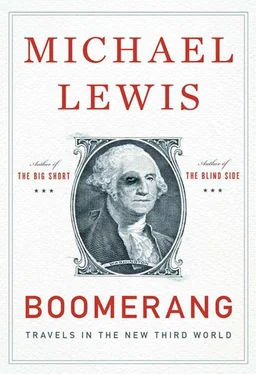When Papaconstantinou arrived here, in October 2009, the Greek government had estimated its 2009 budget deficit at 3.7 percent. Two weeks later that number was revised upward, to 12.5 percent, and actually turned out to be nearly 14 percent. He was the man whose job it had been to figure out and explain to the world why. “The second day on the job I had to call a meeting to look at the budget,” he says. “I gathered everyone from the general accounting office, and we started, like, this discovery process.” Each day they discovered some incredible omission. A pension debt of a billion dollars every year somehow remained off the government’s books, where everyone pretended it did not exist, even though the government paid it; the hole in the pension plan for the self-employed was not the 300 million euros they had assumed but 1.1 billion euros; and so on. “At the end of each day I would say, ‘Okay, guys, is this all?’ And they would say, ‘Yeah.’ The next morning there would be this little hand rising in the back of the room: ‘Actually, Minister, there’s this other one-hundred-to-two-hundred-million-euro gap.’”
This went on for a week. Among other things turned up were a great number of off-the-books phony job-creation programs. “The Ministry of Agriculture had created an off-the-books unit employing 270 people to digitize the photographs of Greek public lands,” the finance minister tells me. “The trouble was that none of the 270 people had any experience with digital photography. The actual professions of these people were, like, hairdressers.”
By the final day of discovery, after the last little hand had gone up in the back of the room, a projected deficit of roughly 7 billion euros was actually more than 30 billion. The natural question—How is this possible?—is easily answered: until that moment, no one had bothered to count it all up. “We had no Congressional Budget Office,” explains the finance minister. “There was no independent statistical service.” The party in power simply gins up whatever numbers it likes, for its own purposes.
Once the finance minister had the number, he went off to his regularly scheduled monthly meetings with ministers of finance from all the European countries. As the new guy, he was given the floor. “When I told them the number, there were gasps,” he said. “How could this happen? I was like, You guys should have picked up that the number wasn’t right . But the problem was I sat behind a sign that said GREECE, not a sign that said THE NEW GREEK GOVERNMENT.”After the meeting the Dutch guy came up to him and said, “George, we know it’s not your fault, but shouldn’t someone go to jail?”
As he finishes his story the finance minister stresses that this isn’t a simple matter of the government lying about its expenditures. “This wasn’t all due to misreporting,” he says. “In 2009, tax collection disintegrated, because it was an election year.”
“What?”
He smiles.
“The first thing a government does in an election year is to pull the tax collectors off the streets.”
“You’re kidding.”
Now he’s laughing at me. I’m clearly naïve.
THE COSTS OF running the Greek government are only half the failed equation: there’s also the matter of government revenues. The editor of one of Greece’s big newspapers had mentioned to me in passing that his reporters had cultivated sources inside the country’s revenue service. They’d done this not so much to expose tax fraud—which was so common in Greece that it wasn’t worth writing about—but to find drug lords, human smugglers, and other, darker sorts. A handful of the tax collectors, however, were outraged by the systematic corruption of their business; it further emerged that two of them were willing to meet with me. The problem was that, for reasons neither wished to discuss, they couldn’t stand the sight of each other. This, I’d be told many times by other Greeks, was very Greek.
The evening after I met with the minister of finance, I had coffee with one tax collector at one hotel, then walked down the street and had a beer with another tax collector at another hotel. Both had already suffered demotions, after their attempts to blow the whistle on colleagues who had accepted big bribes to sign off on fraudulent tax returns. Both had been removed from high-status fieldwork to low-status work in the back office, where they could no longer witness tax crimes. Each was a tiny bit uncomfortable; neither wanted anyone to know he had talked to me, as they feared losing their jobs in the tax agency. And so let’s call them Tax Collector No. 1 and Tax Collector No. 2.
Tax Collector No. 1—early sixties, business suit, tightly wound but not obviously nervous—arrived with a notebook filled with ideas for fixing the Greek tax-collection agency. He just took it for granted that I knew that the only Greeks who paid their taxes were the ones who could not avoid doing so—the salaried employees of corporations, who had their taxes withheld from their paychecks. The vast economy of self-employed workers—everyone from doctors to the guys who ran the kiosks that sold the International Herald Tribune— cheated (one big reason why Greece has the highest percentage of self-employed workers of any European country). “It’s become a cultural trait,” he said. “The Greek people never learned to pay their taxes. And they never did because no one is punished. No one has ever been punished. It’s a cavalier offense—like a gentleman not opening a door for a lady.”
The scale of Greek tax cheating was at least as incredible as its scope: an estimated two-thirds of Greek doctors reported incomes under 12,000 euros a year—which meant, because incomes below that amount weren’t taxable, that even plastic surgeons making millions a year paid no tax at all. The problem wasn’t the law—there was a law on the books that made it a jailable offense to cheat the government out of more than 150,000 euros—but its enforcement. “If the law was enforced,” the tax collector said, “every doctor in Greece would be in jail.” I laughed, and he gave me a stare. “I am completely serious.” One reason no one is ever prosecuted—apart from the fact that prosecution would seem arbitrary, as everyone is doing it—is that the Greek courts take up to fifteen years to resolve tax cases. “The one who does not want to pay, and who gets caught, just goes to court,” he says. Somewhere between 30 and 40 percent of the activity in the Greek economy that might be subject to income tax goes officially unrecorded, he says, compared with an average of about 18 percent in the rest of Europe.
The easiest way to cheat on one’s taxes was to insist on being paid in cash, and fail to provide a receipt for services. The easiest way to launder cash was to buy real estate. Conveniently for the black market—and alone among European countries—Greece has no working national land registry. “You have to know where the guy bought the land—the address—to trace it back to him,” says the collector. “And even then it’s all handwritten and hard to decipher.” But, I say, if some plastic surgeon takes a million in cash, buys a plot on a Greek island, and builds himself a villa, there would be other records—say, building permits. “The people who give the building permits don’t inform the Treasury,” says the tax collector. In the apparently not-so-rare cases where the tax cheat gets caught, he can simply bribe the tax collector and be done with it. There are, of course, laws against tax collectors accepting bribes, explained the collector, “but if you get caught, it can take seven or eight years to get prosecuted. So in practice no one bothers.”
The systematic lying about one’s income had led the Greek government to rely increasingly on taxes harder to evade: real estate and sales taxes. Real estate is taxed by formula—to take the tax collectors out of the equation—which generates a so-called objective value for each home. The boom in the Greek economy over the last decade caused the actual prices at which property changed hands to far outstrip the computer-driven appraisals. Given higher actual sales prices, the formula is meant to ratchet upward. The typical Greek citizen responded to the problem by not reporting the price at which the sale took place but instead reporting a phony price—which usually happened to be the same low number at which the dated formula had appraised it. If the buyer took out a loan to buy the house, he took out a loan for the objective value and paid the difference in cash, or with a black-market loan. As a result the “objective values” grotesquely understate the actual land values. Astonishingly, it’s widely believed that all three hundred members of the Greek parliament declare the real value of their houses to be the computer-generated objective value. Or, as both the tax collector and a local real estate agent put it to me, “every single member of the Greek parliament is lying to evade taxes.”
Читать дальше












